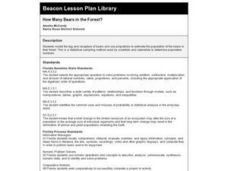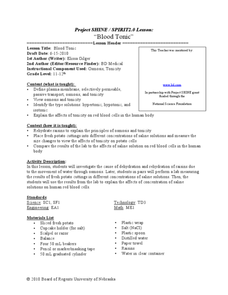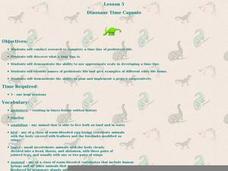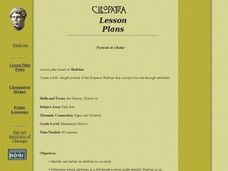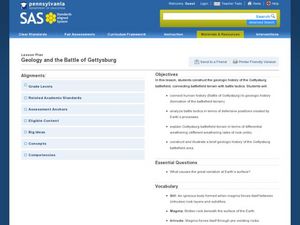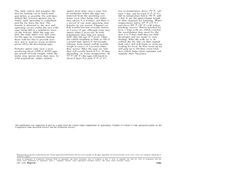Curated OER
Northern Neighbors
Fourth graders research a province in Canada in order to compare and contrast Canada to our country. They create a HyperStudio production to display their findings.
Curated OER
How Many Bears in the Forest?
Third graders model the tag and recapture of bears and use proportions to estimate the population of the bears in their forest. This is a statistical sampling method used by scientists and naturalists to determine population numbers.
Curated OER
Grand Celebration! Broadside
Students research the construction and history of the Erie Canal. They answer discussion questions in small groups, draw and label the Erie Canal on a map of New York State, read and discuss a handout, and complete a worksheet.
Curated OER
Planning A Bicycle Race
Students plan the route of a proposed bicycle race. They indicate the passage through or around regional landmarks. The goal is for students to translate information into a primary language as part of learning a foreign language.
Curated OER
IDP Introduction
Fourth graders examine the three regions of North Carolina through class discussion of favorite places in the state and a review game based on the game of twister. The different colors on the twister sheet represent the different...
Curated OER
Pop Rocket - Trash to Treasure
First off, Newton's laws of motion aren't often taught at 2nd grade, so this lesson may be more appropriate for upper elementary learners. It begins with a discussion and demonstration of the laws of motion, and then has individuals...
Curated OER
Blood Tonic
Young scholars investigate the process of osmosis using fresh potato cuttings in saline solution. In this biology lesson, students explain the difference between hypertonic, hypotonic, and isotonic solutions. They collect data...
Curated OER
Hypoxia and the Dead Zone in the Gulf of Mexico
Students investigate the causes of hypoxia, the characteristics of a watershed, and how the actions and management practices of people can both negatively and positively affect aquatic ecosystems.
Curated OER
How Can You See Which Soda Has More Sugar?
Sixth graders weigh regular and diet soda to see which one is heavier and therefore which one contains more sugar. In this soda lesson plan, 6th graders discover that regular soda contains more sugar because it weighs more.
Curated OER
Corals and Coral Reefs
Students label the continents, oceans, and seas on a provided world map and use it to determine where they would expect most of the world's coral reefs to be found based on provided information the teacher has read to them.
Curated OER
My Beating Heart
Students watch a video over the functions of the heart. They follow along on a website to see how the heart pumps blood.
Biology Junction
Introduction to Animals Crossword Puzzle
In this introduction to animals instructional activity, high schoolers complete a crossword puzzle with 47 questions on the types and characteristics of animals.
Curated OER
Fun With Fish Forms
Students explore fish adaptations and anatomy. In this science lesson, students discuss various adaptations of fish and how those adaptations help them.
Curated OER
Avoiding Sports Injuries
Students research sports injuries and how to deal with the injury. In this injury prevention lesson, the teacher introduces several exercise risk factors and prevention techniques, then students work in small groups to conduct research...
Curated OER
Earthquake Waves And Their Destructions
Students investigate primary and secondary waves and how to measure the magnitude of waves. They discover how to find the epicenter of earthquakes. They examine why waves are more destructive in some areas than others through these...
Curated OER
All About the Senses
For this senses worksheet, 2nd graders use their sensory receptors to collect information. Students complete short answer questions regarding what they observed, felt, smelled, tasted, and heard with their senses.
Curated OER
Animal Research Project
First graders are introduced to the topic of researching by the librarian. Using a worksheet, they use various sources in the library to choose one animal from various groups. They complete a fact sheet on each animal and report their...
Curated OER
Dinosaur Time Capsule
Third graders research prehistoric life using educational software. They design a prehistoric life while showing the use of appropriate scale and names for the prehistoric life. They follow an internet link to participate in a virtual...
Curated OER
Hadrian The Emperor
Students engage in a lesson that is concerned with the historical figure of Hadrian and how he ruled the Roman Empire. They look at images drawn by artists that attempt to capture his character. Students create their own portraits of the...
Curated OER
Geology and the Battle of Gettysburg
Students create geologic maps of the Gettysburg battlefield. In this geologic skills lesson, students consider the variations of Earth's surfaces and explore strategies employed by the North and South in the Battle of Gettysburg to...
Curated OER
An Egg-cellent Osmosis Experiment
Learners investigate the problem of osmosis by conducting an experiment. They use eggs with the shells dissolved to tell whether fluid can move across the membranes. The experiment provides high interest for all kinds of students to keep...
Curated OER
Create and Analyze Rectangular Patterns
Students explore the concept of geometric patterns. In this geometric pattern instructional activity, students use Microsoft Excel to explore geometric patterns. Students analyze growth rates of pattern growth. Students create their...
Curated OER
My Habitat Address
Sixth graders draw a habitat and write about what they would need to survive in the habitat. They define the input of items such as materials, energy, and information, and what goes out of the habitat. They play a "Habitat Address" game,...
Curated OER
Channel Catfish
Students study the life and biology of the Channel Catfish. In this aquatic biology lesson, students will examine the external and internal features of the catfish along with their breeding habits and environment. This lesson includes...



